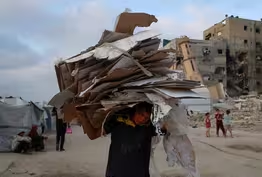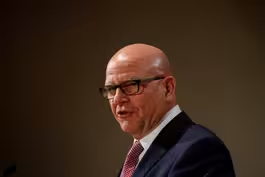
How Iran could respond to U.S. strikes on its nuclear sites
Clip: 6/22/2025 | 4m 52sVideo has Closed Captions
How Iran could respond to U.S. strikes on its nuclear sites
Days before Trump ordered U.S. strikes on Iran’s nuclear program, Iran’s supreme leader warned that American military intervention would result in “irreparable damage.” For more on how Iran could respond to the attack, John Yang speaks with Karim Sadjadpour, a senior fellow at the Carnegie Endowment for International Peace.
Problems playing video? | Closed Captioning Feedback
Problems playing video? | Closed Captioning Feedback
Major corporate funding for the PBS News Hour is provided by BDO, BNSF, Consumer Cellular, American Cruise Lines, and Raymond James. Funding for the PBS NewsHour Weekend is provided by...

How Iran could respond to U.S. strikes on its nuclear sites
Clip: 6/22/2025 | 4m 52sVideo has Closed Captions
Days before Trump ordered U.S. strikes on Iran’s nuclear program, Iran’s supreme leader warned that American military intervention would result in “irreparable damage.” For more on how Iran could respond to the attack, John Yang speaks with Karim Sadjadpour, a senior fellow at the Carnegie Endowment for International Peace.
Problems playing video? | Closed Captioning Feedback
How to Watch PBS News Hour
PBS News Hour is available to stream on pbs.org and the free PBS App, available on iPhone, Apple TV, Android TV, Android smartphones, Amazon Fire TV, Amazon Fire Tablet, Roku, Samsung Smart TV, and Vizio.
Providing Support for PBS.org
Learn Moreabout PBS online sponsorshipJOHN YANG: And now, and now for more on how Iran could respond.
Karim Sadjadpour, a senior fellow at the Carnegie Endowment for International Peace.
Karim, Iran's foreign minister, said a big red line has been crossed and they have to respond.
What do you think?
The range of responses they're considering is.
KARIM SADJADPOUR, Carnegie Endowment for International Peace: As General McMaster said, they have numerous options.
They can go after U.S. embassies and military outposts in the Middle East.
They can try to go after oil installations throughout the Persian Gulf, block major trade routes like the trade of Hormuz.
They could try to rain down more missiles on top of Israel.
The problem they have is that many of these options are like the tactical equivalent of a suicide bombing.
They can do a lot of damage to their adversaries, but they may not survive that blowback.
JOHN YANG: Is returning to the negotiating table a possibility or is that just something they're not even considering?
KARIM SADJADPOUR: Well, eventually I think they will get back to the negotiating table.
The problem Iran has right now is they're in dire straits.
It's a regime fighting for its life.
It doesn't control its own airspace.
It's led by an 86-year-old supreme leader, limited cognitive and physical bandwidth.
He's in bunker.
All of his top military commanders have been assassinated over the last two weeks.
So the regime is in survival mode right now.
JOHN YANG: You mentioned the top military commanders assassinated in the Israeli attacks.
How is that affecting the decision making or planning about a response?
KARIM SADJADPOUR: Well, you can only imagine how the chain of command has been disrupted.
These men who were surrounding the leader for the last three decades, suddenly he woke up one day and most of them were eliminated.
And then he doesn't know that those around him, you know, who could potentially be compromised, be, you know, on the Israeli or the American payroll.
So he's one of the loneliest men in the world right now.
JOHN YANG: Do you think he's in survival mode or is he in defiance mode?
KARIM SADJADPOUR: Well, in some ways it's both because he is one of the longest serving dictators in the world.
He's been ruling since 1989, so he has pretty good survival instincts.
At the same time, his modus operandi has always been resistance, defiance.
When you're being pressured, never compromise because that will invite more pressure.
So his survival instincts and his defiant instincts are in tension right now.
JOHN YANG: Is there any sense of how the Iranian public is reacting to all of this?
KARIM SADJADPOUR: I think the Iranian public in many ways is torn because they're very patriotic population, they love their nation, but many Iranians also hate their regime and they blame the regime for consistently putting their ideological objectives ahead of the well being of people.
But what tends to happen is that people's existing views are accentuated.
So government supporters who are probably around 20 percent of society, have more fodder to dislike America and Israel.
And as I said, regime critics have even more reason to dislike the regime.
JOHN YANG: Over the past year or so, we've seen tremendous changes in the region with all the Iran's private proxies sort of being dismantled.
What's the current dynamic in the region now?
How does Iran stand?
Where does Israel stand?
Where does the U.S. stand?
KARIM SADJADPOUR: Well, after the U.S. invasion of Iraq in 2003, up until October 7, 2023, when Hamas invaded Israel, in some ways we can look back and say that was the Iran era, Iran's axis of resistance era in the Middle East.
They were dominating five Arab lands, Syria, Lebanon, Yemen, Iraq and Gaza through their proxy militias.
They overreached on October 7th after the Hamas attack against Israel.
Supreme Leader Khamenei was the only leader in the world to endorse that act, that attack.
And I think we're now entering a post-Islamic Republic era in the Middle East.
But who is going to fill that vacuum is still unclear.
JOHN YANG: Do you agree with the analyst that Nick quoted saying that this is probably ironically going to convince the Supreme Leader that he needs a nuclear deterrent?
KARIM SADJADPOUR: I don't think he's going to be the leader is going to be Iran that much longer to make that decision.
But I do think that whoever succeeds him as Iran's powerful leader will likely conclude that the country does need a nuclear weapon.
You look at governments that have given up their nuclear program, Saddam Hussein, Gaddafi's Libya, Ukraine, they all made themselves vulnerable to external intervention.
Who has a cloak of immunity?
The North Koreans.
JOHN YANG: Karim Sadjadpour, thank you very much.
KARIM SADJADPOUR: Thank you, John.
Desperation mounts as Gazans are killed while seeking aid
Video has Closed Captions
Clip: 6/22/2025 | 4m 45s | Desperation mounts in Gaza as Palestinians are killed while seeking food aid (4m 45s)
Former national security adviser analyzes U.S.-Iran strikes
Video has Closed Captions
Clip: 6/22/2025 | 6m 8s | Former national security adviser analyzes U.S. airstrikes on Iran (6m 8s)
A look inside the U.S.’ unprecedented direct attack on Iran
Video has Closed Captions
Clip: 6/22/2025 | 4m 52s | What we know about the U.S.’ unprecedented direct attack on Iran (4m 52s)
News Wrap: Gunman killed after shooting into Michigan church
Video has Closed Captions
Clip: 6/22/2025 | 2m 29s | News Wrap: Gunman killed after shooting into Michigan church (2m 29s)
Providing Support for PBS.org
Learn Moreabout PBS online sponsorshipSupport for PBS provided by:
Major corporate funding for the PBS News Hour is provided by BDO, BNSF, Consumer Cellular, American Cruise Lines, and Raymond James. Funding for the PBS NewsHour Weekend is provided by...















